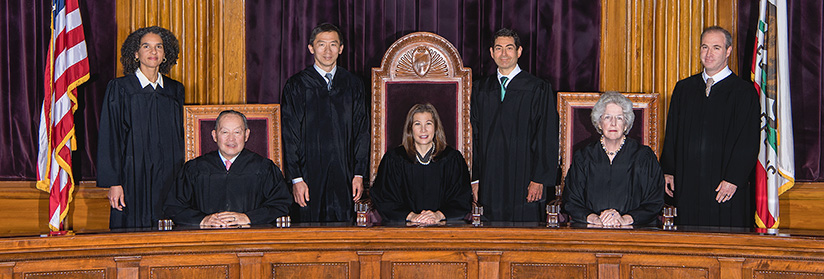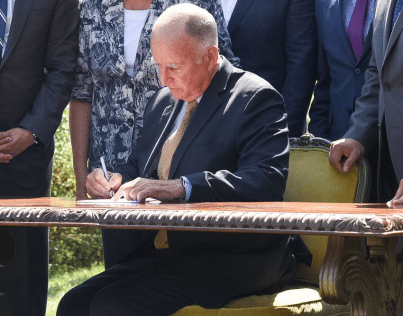
Uber App. (Photo: Katy Grimes for California Globe)
California Supreme Court Ends Legal Snafu Over Gig Drivers – Upholds Prop. 22
Drivers at Uber, Lyft, and others are not employees, California’s Supreme Court rules
By Katy Grimes, July 26, 2024 10:53 am
In November 2020, California voters overwhelmingly passed Proposition 22, to exempt all rideshare drivers from being classified as employees.
But labor unions and some drivers sued to halt the proposition.
Thursday, California’s Supreme Court upheld Proposition 22, allowing drivers at Uber, Lyft, and other ride share companies to operate as independent contractors, rather than employees.
Prop. 22 was initiated to exempt all rideshare workers from being classified as employees because of the very controversial AB 5, the labor union-funded contractor reclassification law that went into effect in California in January 2020.
AB 5, authored by Democrat Assemblywoman Lorena Gonzalez (who left the CA Legislature early to head up the California Labor Federation), completely redefined independent contractors in California, as well as greatly reducing the number of contractors in the state by creating an “ABC test” that instead made them employees, or put them out of work.
AB 5 was passed by Democrats in the California Legislature and signed into law in 2019 by Gov. Gavin Newsom.
The stated intent of AB 5 was to force “Gig Economy” rideshare companies to reclassify their drivers as employees, rather than allowing them to work as independent contractors, which would have destroyed the company’s very business model, and made the drivers vulnerable to unionization, which really was the end goal.
AB5 didn’t just target California’s “gig economy;” it outlawed all independent contractors with few exceptions – including independent truckers, traveling physicians and nurses, actors, musicians, and many more independent contractors.
Rideshare and delivery companies Uber, Lyft, DoorDash, Postmates, and Instacart spent more than $200 million dollars on the campaign to pass Prop. 22, saying passage of the initiative was the only thing that could keep many of the companies in California, with the heightened costs for both the company and consumer should they have had to classify drivers as full employees.
In August 2020, the rideshare companies were days away from halting all California service because of a court order, which led to appeals and eventually the California Supreme Court.
The California Supreme Court just upheld Proposition 22 to allow Uber, Lyft and other gig employees to classify drivers for their ride-hailing and delivery services as independent contractors rather than as employees, the LA Times reported.
The unanimous ruling rejected claims brought by a group of drivers and a major labor union that the law is unconstitutional because it interferes with lawmakers’ authority over matters dealing with workers’ compensation.
In the SEIU lawsuit, the union argued that the ballot initiative unconstitutionally limited the power of California to implement a compensation program, unconstitutionally limited the passage of workers’ rights legislation, and violated the constitution of California by not addressing a single subject.
This was a crisis created by the California Legislature and Governor, and needed to be reversed by the Legislature and Governor. But they did not.
The problem with AB 5 is that the bill was based on the legally flawed California Supreme Court Dynamex decision.
In 2018, the California Supreme Court’s decision in Dynamex Operations West, Inc. v. Superior Court of Los Angeles dealt a blow to independent contractors. The Court ruled that the Dynamex delivery drivers were employees, rejecting its own prior test for determining whether workers should be classified as either employees or independent contractors,” Forbes reported.
According to many legal analysts, what the Court did was legislate from the bench by adopting a new rule for the narrow purpose of interpreting California’s Industrial Welfare Commission’s wage orders.
Notably, Supreme Court Justice Goodwin H. Liu wrote in the decision:
“the Legislature has made a number of exceptions to the general eligibility rule in order to extend workers’ compensation to nonemployees;” and
“We have no need in this case to decide the applicability of our reasoning in County of Los Angeles to Proposition 22 or to determine the extent to which article XIV, section 4 may limit the initiative power. We reserve these issues until we are presented with an actual challenge to an act of the Legislature providing workers’ compensation to app-based drivers;”and
“Plaintiffs assert in their reply and answer to amicus curiae briefs that the Legislature has already extended workers’ compensation benefits to app-based drivers through Assembly Bill No. 1766 which was enacted after Proposition 22. They point to a provision of Assembly Bill 1766 that prospectively revised the definition of “employee” in Labor Code section 3351, subdivision (i) to include “any individual who is an employee pursuant to section 2775.” They say that by “updat[ing] an obsolete cross-reference” in this provision, the Legislature “reaffirm[ed] that ‘any individual who is an employee pursuant to [Labor Code] Section 2775’ (which codifies the ABC test) is covered by the workers’ compensation system.” But plaintiffs do not cite any authority for their claim that this updated cross-reference effectively recodifies the ABC test for app-based drivers, nor do they demonstrate that their theory has ever been tested in litigation. At this juncture, it is not clear that “there is already a direct and irreconcilable conflict between section 7451 and a statute adopted by the Legislature after Proposition 22 was enacted,” as plaintiffs contend. In any event, that question is not before us, and we express no view on it.”
It will be interesting to see any further challenges to Proposition 22. Some legal analysts say that the California Supreme Court created this 5-year employment mess with their flawed Dynamex decision, and effectively just started cleaning up that confusing mess.
- Trump State of the Union: Democrats Showed They’re Not On the Side of The American People - February 25, 2026
- Leaving California: Public Storage Relocates HQ from California to Texas - February 25, 2026
- California Democrats Propose Government Takeover of Healthcare, Banning Private Insurance - February 24, 2026




Well, okay, getting Prop 22 straight only four years later, after 60% of Californians voted for it, is good news I guess for this state. Such IRRESPONSIBLE and BRAINLESS legislators passing AB 5 in the first place, with then-Asm Lorena Gonzalez the Queen B of it all, after which she left the legislature to be the Queen B of Union Hacks.
I sure as heck hope we are near the end of this ridiculous disgusting era and we can begin to clear away the flotsam and jetsam and start cleaning California up. Not the fake flashy way of Gruesome recent “executive order” but a real cleanup. In every way. Guess we’ll see..
Shawandtell I believe that we are at the “end of this ridiculous disgusting era”. It’s going to be bumpy for a bit because this crowd will do anything imaginable or unimaginable to stay in power.
Cautiously optimistic. Fingers crossed.
Leftists! Get ready to lose on every issue all the time. Your time is over.
“The stated intent of AB 5 was to force “Gig Economy” rideshare companies to reclassify their drivers…” The unintended consequence is that older retired workers like myself couldn’t do work for the company they retired from without requiring full benefits or being a consultant. The silver lining is that I not longer pay state income tax.
many years.ago..i.r.s established rule of thumb for things like employee/employer..employee.paid by employer..working same area…working hours.established….set wage…most.gig.workers work on.comission.only.receiving.call
.they are independent but.barely